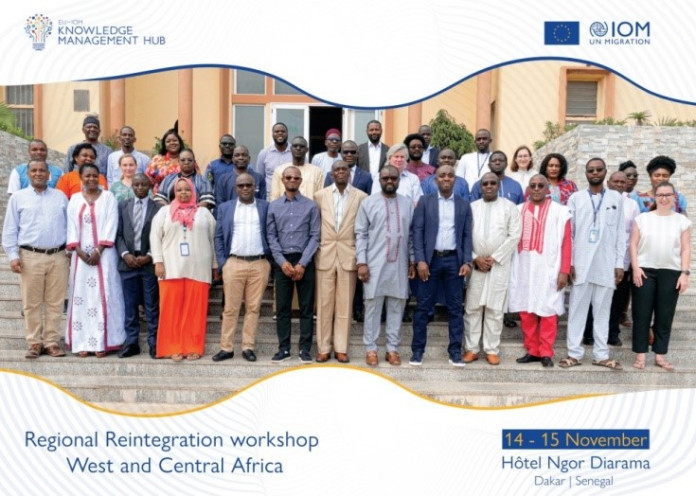The International Organization for Migration (IOM) facilitated a pivotal three-day Cross-Regional Technical Coordination Workshop in Côte D’Ivoire, Abidjan, from March 5 to 7, 2024 to foster cooperation among stakeholders involved in return and reintegration in Africa.
The workshop, held as part of the Migrant Protection, Return and Reintegration (MPRR) programme operating in North and Sub-Saharan Africa and supported by the European Union (EU), saw the active participation of Government representatives and IOM staff from 21 countries alongside delegates from the EU in discussions on how to achieve crucial collaboration and strategic dialogue.
“It is important to have continuous system-building efforts inside the countries of origin, aimed at consolidating national referral mechanisms for migrant returnees, but also the significance of clear, practical bi-lateral protocols with major host countries,” said Ms. Nsikan Simon Essien, Head Psychosocial Support Unit at the National Commission for Refugees, Migrants, and Internally Displaced Persons (NCFRMI) in Nigeria. “The present workshop provides the perfect space for pursuing these action lines,” she added.
Key points discussed during the workshop included improving migrants’ and returnees’ access to protection and basic services, to legal identity and consular support, and addressing priorities for capacity building, such as child protection and national coordination mechanisms.
Discussions also addressed resource gaps for reintegration assistance and explored sustainable solutions that are in line with global commitments such as Objective 21 of the Global Compact for Safe, Orderly, and Regular Migration (GCM), as well as the African Union’s Migration Policy Framework for Africa and Plan of Action (2018-2030), which call for increased international cooperation and support for reintegration.
Khaled Elnakkady, Head of Migration and Anti-Smuggling Unit at the National Coordinating Committee for Combating Illegal Migration and Trafficking in Persons (NCCPIM& TIP) – Egypt said that the committee finalized the development of a national referral mechanism for return and reintegration, which provides a specific role for each national authority concerned with providing services to returnees to ensure their reintegration, with a special focus on services provided to returning children such as their reintegration into schools.
NCCPIM&TIP also established the “Fund for Combating Illegal Migration and the Protection of Migrants and Witnesses” to manage the referral mechanism and to finance it through cooperation with donors and international organizations, he added.
“The National Referral Mechanism in Ethiopia is implemented in tandem with the National Reintegration Directive which follows IOM’s model of integrated approach to reintegration, aims to address reintegration from an individual, community, and structural levels and is important extending basic services and assistance to vulnerable migrants and returnees upon return,” said Mr. Abel Gebregzihaber, Senior Prosecutor from the Ministry of Justice.
A major outcome of the workshop was the development of a roadmap outlining return and reintegration priorities in the relevant countries for the next three years. This roadmap will guide collective efforts, reinforce operational coordination, and empower stakeholders with a coordinated approach to advocate for additional resources to bridge the gap in return and reintegration support.
This workshop represents a significant step in IOM’s ongoing efforts to deepen engagement with governments and strengthen their ownership of return and reintegration processes. It also underscores IOM’s commitment to enhancing migration governance across Africa.
This event was made possible through the financial support of MPRR programmes, funded by the Directorate-General for the European Neighbourhood Policy and Enlargement Negotiations (DG NEAR) and Directorate-General for International Partnerships (DG INTPA) of the European Commission.




